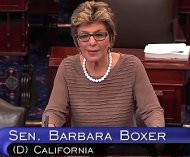7/2/2012
Congress Slams Red Light Cameras, Funds HighwaysPassage of federal highway funding bill includes provision banning US taxpayer subsidy for red light cameras.

Congress on Friday authorized spending $96 billion on various transportation and transit programs through the year 2017, but none of that money will go to red light cameras. House Highways and Transit Subcommittee Chairman John J. Duncan Jr (R-Tennessee) succeeded in inserting language into the final conference report that prohibits the use of Section 402 federal grant money for automated ticketing machines.
"A state may not expend funds apportioned to that state under this section to carry out a program to purchase, operate, or maintain an automated traffic enforcement system," HR 4348 states.
According to a 2003 report by the Government Accountability Office, this funding, which ultimately comes from the federal tax on gasoline, was used to create the red light camera programs in Decatur, Georgia and Howard County, Maryland. As part of a compromise with the Senate, however, another provision was slipped in prohibiting the use of Section 104 grants for the use of red light cameras but allowing the funding for school zone speed cameras, such as those recently approved by Chicago, Illinois Mayor Rahm Emanuel (D). The original version of the House legislation contained a complete ban on US taxpayer funding for both red light cameras and speed cameras.
Conservatives in the House likewise compromised their goal of trimming spending and, in the end, succeeded in only shaving $13 billion, or 12 percent, from the amount the Senate wanted to spend. The final product nonetheless received broad support in both chambers, passing the House 373 to 52 and the Senate 74 to 19. Republicans touted the reform measures adopted in the bill.
"'Shovel ready' became a national joke because projects get bogged down for years in the wasteful, bureaucratic project review process," Transportation and Infrastructure Committee Chairman John L. Mica (R-Floria) said. "The dramatic reforms in this measure will get projects moving by cutting the red tape that delays projects across the country and drives up construction costs."
Democrats pointed to the preservation of motorist funding for non-motorist projects as a victory for their side.
"We know we have transit systems that need to make capital improvements," Environment and Public Works Committee Chairman Barbara Boxer (D-California) said following the vote. "We know we have bike paths that need fixing and pedestrian walkways that need fixing. And all of that has been resolved. Now are there things in this package I don't like? Absolutely. Are there things in this package my Republican counterparts don't like? Absolutely. We had to give, we had to take."
The bill becomes law when signed by the president.


